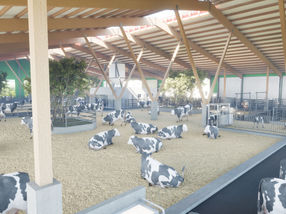KiESEL study: young children eat twice as much sugar as recommended
Advertisement
Too many sweets and soft drinks, too few vegetables: in children up to the age of five, the consumption of unhealthy foods more than doubles the recommended daily maximum. At the same time, girls and boys of this age eat too little healthy food, especially vegetables. This is shown by a recent analysis of study data at the Max Rubner Institute (MRI), which was published in July in the journal "Frontiers in Nutrition". The scientists also found some significant deviations from the recommendations for children for other food groups and some nutrients.
"Nutrition in the first years of life forms the foundation for children's development and health and is formative for later eating habits," says Prof. Dr. Regina Ensenauer, Director of the Institute of Child Nutrition at the MRI and senior author of the article. Despite this importance, there are still many unanswered questions about children's nutrition. For this reason, detailed data on the nutrition of young children and preschool children was collected in the Children's Nutrition Study to Record Food Consumption (KiESEL) between 2014 and 2017. The project was led by the Federal Institute for Risk Assessment and is being evaluated in depth at the MRI.
The MRI has now completed the analyses of the KiESEL data on food consumption and the energy and nutrient intake of 890 children aged between one and five years. The average energy and nutrient intake was calculated from the information provided by the parents, who recorded all the food and drinks consumed by the child on four days as part of the study. The scientists then compared the results with the consumption recommendations (optimized mixed diet for children and adolescents) and the reference values for energy and nutrient intake for the age groups studied.
Unfavourable foods, including sweets and soft drinks, account for an average of between 25 and 36 percent of the daily energy intake of girls and boys aged between one and five years (instead of a maximum of ten percent). More than half of the children also exceeded the recommended amount of meat. In contrast, the consumption of vegetables was too low for all children and the consumption of milk and dairy products was also below the recommendations. The data show that preschool children eat more unfavorable foods than toddlers, and that boys eat more unhealthy foods than girls. In the study, unfavorable habits were already apparent at the age of two and became even more pronounced at the age of three.
The average energy and nutrient intake of both toddlers and preschool children is largely in line with the recommendations. In a previous analysis, however, the scientists found that vitamin D and iodine intakes were too low. In addition, the iron intake of toddlers and the calcium intake of preschool children is too low. In contrast, their intake of saturated fatty acids, sugar and proteins is too high. "There is a need for research into the question of whether routine vitamin D supplementation should be extended beyond infancy," says Dr. Stefan Storcksdieck called Bonsmann, acting head of the Institute for Nutritional Behavior at the MRI and co-author of the specialist article. "In addition, the use of iodized salt instead of non-iodized table salt would contribute to an improved iodine intake. This is important information, not only for parents, but also for the food industry."
Overall, the results show that unfavorable nutritional behavior can develop at a very young age. There is evidence that it is precisely this period that is crucial for the prevention of diet-related diseases. Measures to promote a healthy diet and reduce the consumption of unhealthy foods in the first years of life are therefore of great importance.
Note: This article has been translated using a computer system without human intervention. LUMITOS offers these automatic translations to present a wider range of current news. Since this article has been translated with automatic translation, it is possible that it contains errors in vocabulary, syntax or grammar. The original article in German can be found here.




































































